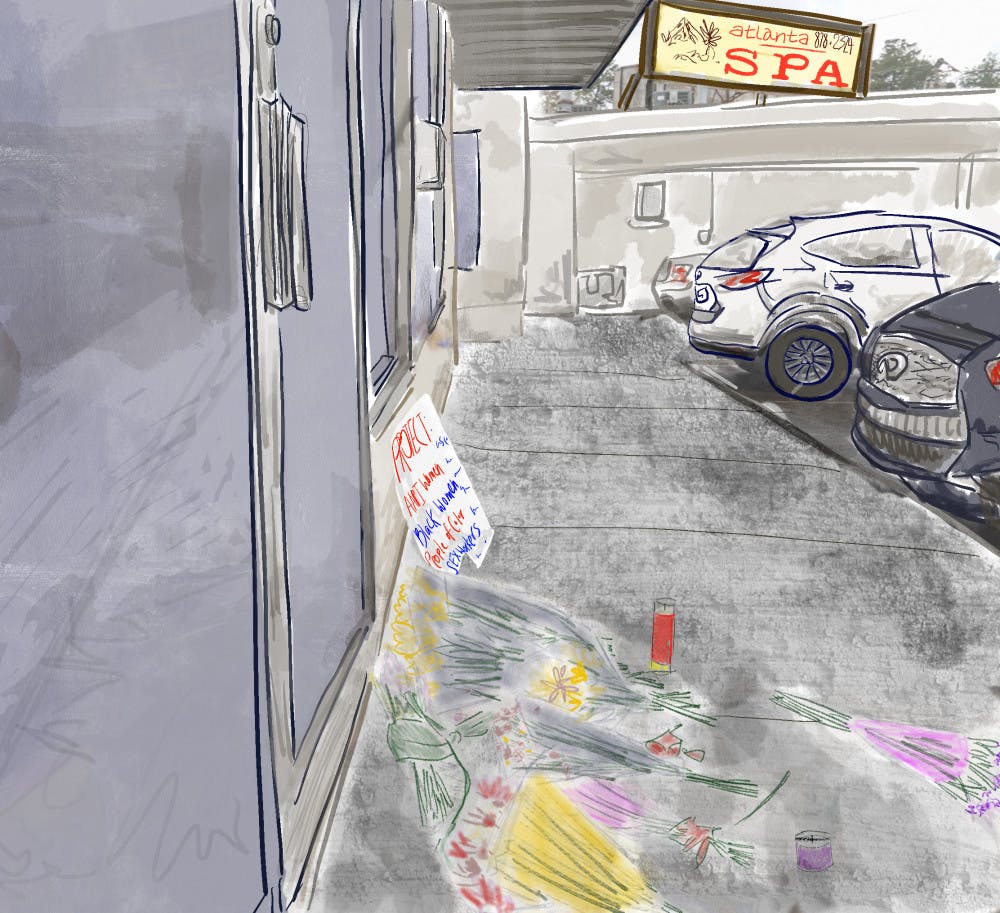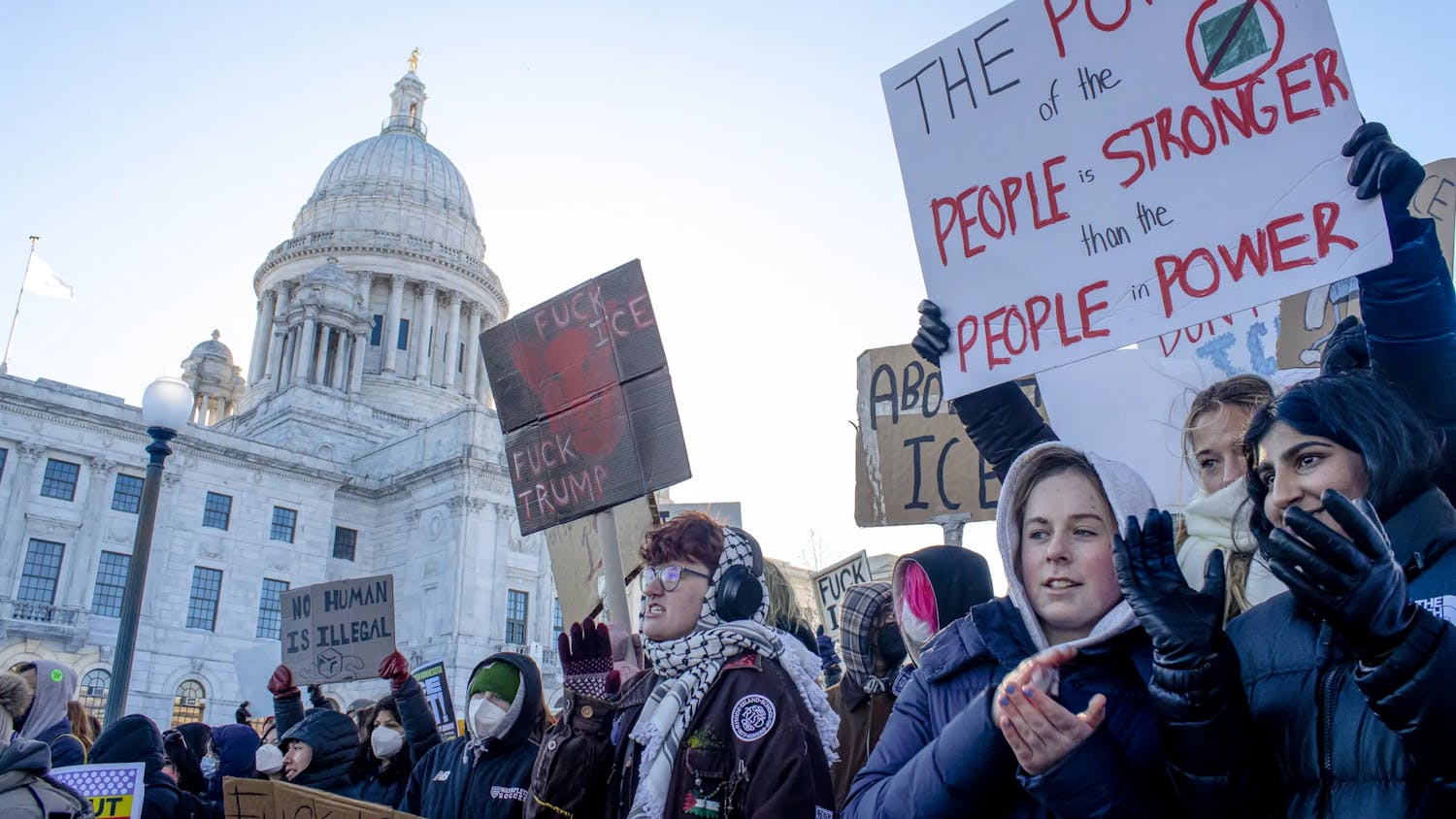A deadly shooting at three different massage parlors in Atlanta last Tuesday shocked members of the Brown community, the nation and the world. Eight people — including six Asian women — were killed after a man opened fire at Young's Asian Massage, Gold Spa and Aromatherapy Spa. The victims of the tragedy were Soon Park, Hyun Grant, Suncha Kim, Yong Yue, Xiaojie Tan, Daoyou Feng, Delaina Yaun and Paul Andre Michels.
Reactions to the mass shooting burgeoned on social media, with many Asian Americans pointing to the correlation between the event and the rise in violence against their communities since the onset of the pandemic. They also brought attention to the intersection between racism and misogyny and the existing discrimination against Asians endemic to America’s history.
The Herald spoke to students, faculty and community members about their reactions to this tragedy.
Students react to the tragedy
“I was shocked of course, but I feel like I wasn’t as shocked as I would have expected myself to be.”
Yanhoo Cho ’21.5, co-coordinator of Brown Asian Sisters Empowered, said she didn’t feel emotionally prepared when she received the news. She and her Asian friends checked in on each other. Later, feeling a sense of urgency to host an event for Asian women that week, she and BASE Graduate Coordinator PhD ’21 Amy Chin decided to organize the BASE Emergency Gathering.
“(It was) for us to grieve and even go beyond that and have moments of solidarity and really take action,” Cho said. “I’m really glad that BASE was able to still create space where we weren’t left completely numb or inactive.”
Nearly 100 students, faculty and community members attended the virtual event last Friday.
Brown professors Naoko Shibusawa, Evelyn Hu-Dehart and Elena Shih of the American Studies department delivered opening remarks at the event.
Following the opening, BASE co-coordinators facilitated three breakout sessions on the topics of Asian invisibility, allyship and solidarity; healing and testimonies; and organizing for Rhode Island massage workers.
BASE Co-Coordinator Audrey Buhain ’22, said that the BASE event was one of only two on campus held for processing grief and other feelings for the community, the other being the BCSC Asian and Asian American Community Gathering that was held this Monday.
“(This) literally was just one of those moments where a community already in grieving even has to be responsible for laboring to care for one another when no one else will,” she wrote in a message.
Chin also created a living and accessible document of Asian Americans’ needs, in which attendees brainstormed resources and programs the Asian American community would like to see, including ways to mobilize Asian students, faculty and alumni. Community members are encouraged to add their needs to the document, Cho said.
Rachelle Shao ’22 heard the news the morning after the incident. “I was shocked of course, but I feel like I wasn’t as shocked as I would have expected myself to be,” she said. “A part of me feels like something like this has been bound to happen” given the recent uptick in violence against Asians and Asian Americans during the pandemic.
Shao said that she’s experienced racism her whole life, and that despite her frustration, sadness and anger, she is glad that people are starting to recognize the reality of Asian American racism.
“I have seen some people saying COVID sparked Asian American racism. I don’t really believe that,” Shao said. “I think it’s always been there, it’s just that it is rising to the surface more, that there is more fuel to the fire so people feel more open to express their racist thoughts.”
She hopes that this will empower Asian Americans to be more vocal about the racism they face and bolster solidarity for Asian Americans nationwide.
Shao, who is also the community outreach chair for the Chinese Student Association, said that the organization is donating $150 to the Asian American Political Alliance to be distributed to other organizations and nonprofits.
Joyce Lee ’22, a representative from Brown Asian American Political Alliance, said when the news first broke, she felt “incredibly sad and disappointed” that media outlets had placed what she felt to be an outsized focus on the alleged perpetrator and his background. She said she felt that emphasis was “incredibly insensitive” to the victims.
Before last week’s shootings, according to Joyce Lee, AAPA had been planning to raise funds for Asian American organizations working to combat the rise in anti-Asian sentiment. But now, AAPA will be shifting their focus toward raising funds for Asian Americans Advancing Justice-Atlanta, a nonprofit legal advocacy organization, she said.
Black Student Union, Students for Educational Equity and League of United Black Women released statements of solidarity. The Class Coordinating Board also sent an email to confront Asian and Pacific Islander racism and violence.
Faculty weigh in on legacy of anti-Asian racism
“The notion of Asians as aliens is deeply rooted in American culture”
Associate Professor of American Studies Robert Lee PhD ’80 said he felt “shock and surprise” when he heard about the shootings last week.
But “we saw this coming,” he said. “We knew (something like last week’s shootings) was going to happen. We didn’t know exactly where it was going to happen or to whom.”
Robert Lee, who is currently teaching ETHN 1200C: “Asian Americans and the Racial State,” said last week’s shootings were a product of “the historical violence against Asians in the United States.”
Mass violence against Asians “is deep in American history,” Robert Lee said, citing five mass killings targeting those of Asian descent — including one in 2012 in Wisconsin that left six dead at a Sikh temple, another in 1989 in Stockton, California that left five Southeast Asian schoolchildren dead and more than 30 wounded as well as one in 1871 in Los Angeles that killed 10 percent of the city’s Chinese population at the time.
“The notion of Asians as aliens is deeply rooted in American culture,” Robert Lee added. Acts of violence against Asians are “done in the name of protecting America” against those racially othered as “alien,” he said.
Associate Professor of History Naoko Shibusawa wrote in an email to The Herald that conversations about the event must encompass the nuance of anti-Asian racism as it relates to racism against other minorities. “What remains poorly understood is how anti-Asian racism is not simply a less intense form of anti-Black racism,” she wrote. “In some ways it is, and in other ways it is not.”
“To understand racism as a system with upper caste (white), middle caste (Asians and Latinx) and lower caste (Black and Indigenous) is too simplistic,” she wrote.
Understanding anti-Asian racism involves grappling with imperialism, overseas colonialism and America’s military involvement in Asia, according to Shibusawa.
“We need to understand the pivotal role war has in the history of Asian Americans,” she wrote. “Most of us are here in some way or another because of U.S. wars against or within our countries of origin.”
Within a war economy, Asian women’s bodies have historically been considered an entitled “comfort,” part of rest and recreation, according to Shibusawa.
“Asian women are racialized as sex objects and are part of a fantasy of American imperialism,” Lee said. This perception, and the military culture it emerged from, has created the “same kind of sexualized violence that we see in Atlanta,” Robert Lee agreed.
Robert Lee hopes that last week’s shootings will allow students a moment of “deep reflection” and recommitment to social justice activism, as well as recognition of the “different trajectories” and “different dynamics” that play into anti-Black racism and anti-Asian racism.
While it’s too soon to tell how last week’s mass killings will be remembered in the future, “it’s really up to us … to make sure that we understand very clearly the trajectory of race as it relates to Asian Americans so that this event and all the events that preceded it are remembered,” Robert Lee said. “They’re part of our history and we need to be able to confront that.”
Robert Lee also told The Herald that neither he nor his colleagues of Asian descent at the University were consulted before President Christina Paxson P’19 sent a community-wide message addressing violence against Asian and Asian American communities.
While he said that he felt that Paxson’s message was certainly well-meaning and sympathetic, he was “disappointed” by the lack of communication from the University with Asian and Asian American faculty.
In response, University Spokesperson Brian Clark wrote in an email, “Given the sharp rise in reports of anti-Asian bias and violence in recent months, Brown administrators have been engaged with impacted faculty, staff and students for several weeks, gaining important insights and perspectives around these difficult issues and providing support.”
Local community members call for action, reform
“We wish the media would call it for what it is, a hate crime, and acknowledge these women outside of their labor”
Cho is not only a co-coordinator of BASE but also an organizer for Red Canary Song’s spa outreach team.
Red Canary Song is a collective of Asian migrant sex workers based in Flushing, New York that organizes across the New England region, she said.
“Asian massage parlors are everywhere and they’re affected by very similar but different (state-by-state) policy and laws that are discriminatory,” Cho said. These businesses are often raided, and workers arrested, for not having a massage license, which is expensive to obtain, she added.
Cho said the “hate crime” that occured in Georgia is not necessarily the result of less policing of these areas, and that the solution should be rooted in “standing with these massage workers simply as neighbors who will protect them and care for them and look after them.”
Looking to the future, Cho emphasized the importance of destigmatizing sex work and including sex workers’ voices in policies that impact them directly.
A collective of members from Ocean State Ass, a local mutual aid organization for Rhode Island sex workers, wrote in an email to The Herald that the incident deeply affected their members and that “the fetishization of Asian American woman and sexual violence against sex workers go hand in hand. This was undeniably a hate crime and to say otherwise is white supremacy in action.”
“We wish the media would call it for what it is, a hate crime, and acknowledge these women outside of their labor,” they added.
The organization supports a letter written by Red Canary Song, and many of the group’s members attended Red Canary Song’s Thursday vigil for the victims as well.
The organization said decriminalization of sex work instead of heightened policing could better protect this population, and the organization’s goal is to ensure sex workers have the resources and rights they need to make their voices heard. The organization also hopes the tragedy will catalyze larger conversations about issues sex workers face, they said.
“We want to acknowledge and center the personhood of the people killed in the shooting,” they wrote. “They were people with full and complex lives and experiences outside of the environment in which they labored.”





